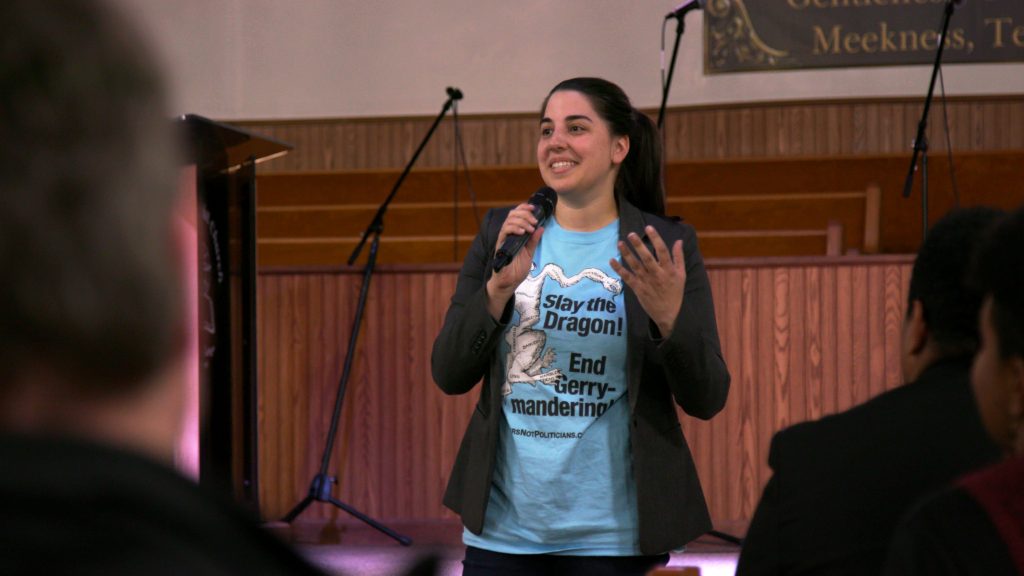Barak Goodman, Chris Durrance, documentaries, film festivals, gerrymandering, Katie Fahey, movies, New York City, politics, reviews, Slay the Dragon, Tribeca Film Festival
April 27, 2019
by Carla Hay

Directed by Barak Goodman and Chris Durrance
World premiere at the Tribeca Film Festival in New York City on April 27, 2019.
The political documentary “Slay the Dragon” is part history lesson, part wake-up call to U.S. voters. The movie focuses on gerrymandering, the longtime practice of manipulating and rezoning voting districts so that one political party has a disproportionately favorable advantage over others. The word “gerrymander” was inspired by Elbridge Gerry (the Massachusetts governor credited with inventing the practice in the early 19th century) and the word “salamander,” since one of his rezoned districts looked like a salamander.
Even though “Slay the Dragon” mentions that Democrats and Republicans are guilty of gerrymandering, “Slay the Dragon” portrays Republicans as being more ruthless and more corrupt when putting gerrymandering into practice. The 2016 election of Donald Trump as president of the United States, as well as the Republican party’s dominance of the U.S. House of Representatives and Senate elections that year, can be considered the flashpoint for much of the grass-roots activism that gets the spotlight in this movie.
“Slay the Dragon” co-director Barak Goodman says that this documentary was largely inspired by David Daley’s 2016 nonfiction book “Ratf**ked: Why Your Vote Doesn’t Count,” which details how gerrymandering was taken to new levels of corruption by Republicans, in response to the 2008 U.S. presidential election of Barack Obama and Democrats who dominated Congress during Obama’s first term. Daley, who is interviewed in the film, is also a consultant for the documentary. Also interviewed in the film are Mother Jones senior reporter Ari Berman and Republican State Leadership Committee chief Chris Jankowski, a political strategist who is often credited with the Republicans’ dominance of the 2016 elections.
But the film’s real star is Katie Fahey, founder of the Michigan-based grassroots organization Voters Not Politicians. Fahey, an upbeat activist in her 20s, had no political experience when she started Voters Not Politicians. Against the odds and predictions of naysayers, Voters Not Politicians managed to get the state of Michigan to create an independent commission to oversee voter redistricting. Voters Not Politicians is supposed to be a non-partisan group, but it’s clear that most of the group members are left-leaning voters who are more alarmed by Republicans taking over their districts than Democrats.
“Slay the Dragon” also examines the racism behind gerrymandering, which usually targets blacks and Latinos as groups to manipulate when reshaping voting districts. The 2014 Supreme Court case McCutcheon et al. v. Federal Election Commission, which eliminated limits on campaign donations for federal elections, is considered one of the main reasons why gerrymandering has placed even more political control in the hands of the wealthy. “Slay the Dragon” gives hope to those who believe that voters who aren’t wealthy have a real chance of making a difference if they band together to fight corruption.
UPDATE: Magnolia Pictures will release “Slay the Dragon” on digital and VOD on April 3, 2020.
